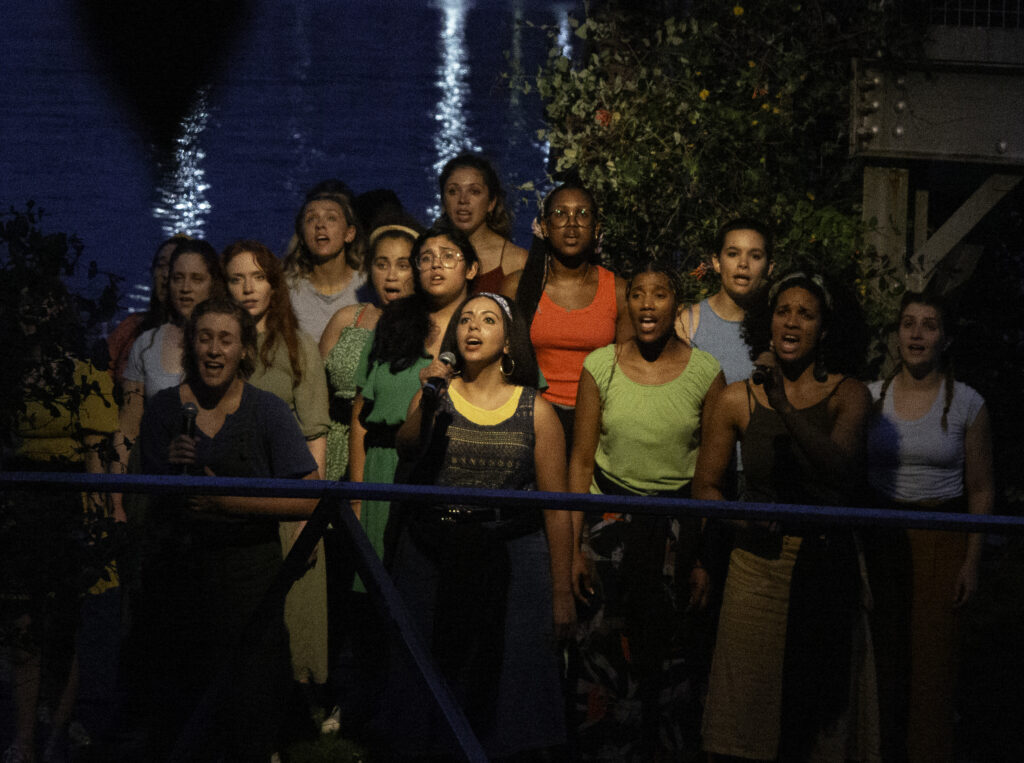
Photo by Danielle Fauteux Jacques.
Presented by Apollinaire Theatre, in collaboration with Teatro Chelsea and the City of Chelsea
Play by Aeschylus, adapted by David Greig
Music by John Browne
Directed by Danielle Fauteux Jacques
Choreography by Audrey Johnson
Music Direction by David Reiffel
Accompanied by Aneesh Kashalikar, Laura Jordan, Stephen Guerra
Featuring Paola Ferrer, Brooks Reeves, Andres Molano, Parker Jennings, Pearl Scott, Charleen Andujar
August 2 – 17, 2024
Fridays and Saturdays @ 7:30pm
Pre-show starts at 6pm, featuring music from members of the ensemble and beer and food from local vendors
Content advisory for mentions of sexual violence.
Free at Port Park
99 Marginal Street, Chelsea MA
Information here
The production is Bilingual, English/Spanish.
Critique by Maegan Bergeron-Clearwood
CHELSEA, Mass. — Last month, the Healey administration announced a new policy that caps overflow shelter stays to only five days. Days ago, just before the policy went into effect, the administration relaxed the guidelines for individuals who meet certain criteria — but many migrant families are still facing the very real, very immanent threat of having nowhere to go. It’s heartbreaking, made even more so because it’s barely a blip on the news cycle’s radar.
“The worries of women and exiles are endless,” the titular suppliant women of Aeschylus’ 2,500-year-old play exclaim, in this eerily prophetic production by Apollinaire Theatre Company. Over and over, the women plead for compassion from kings and citizens who are more concerned with consolidating their own power than opening their doors to those in need.
Rarely do I see a play that feels like it has a heartbeat, but Danielle Fauteux Jacques’ staging of this outdoor production creates an of alchemy of rhythm, sound, and movement that is undeniably alive. David Greig’s version of the text is poetic and mournful, accompanied by a seamless bilingual translation; music by John Browne provides the world with a reverberating sonic landscape; Audrey Johnson’s choreography gives the Women’s Chorus a pulsating, collective synergy that underscores important narrative and emotional beats; and the ensemble itself is hypnotically in-sync, leading the audience through waves of heartache, fear, and hope.
Aeschylus’ ancient play is the only surviving part of a trilogy that has otherwise been lost to history. The suppliant women are descendants of Io, a maiden who was seduced by Zeus and subsequently turned into a cow by Hera. Threatened with forced marriage to their cousins, the 50 women (here portrayed by an ensemble of about 20) vow never to marry and flee to Greece. Negotiations for asylum are led by the women’s father, Danaos, and the King of Greece, formidably played by Apollinaire stalwarts Paola Ferrer and Brooks Reeves respectively.
In an unusual twist for a Greek play, the Chorus is not in service of a protagonist, but rather is the protagonist. Chorus Leaders Parker Jennings, Pearl Scott, and Charleen Andujar voice the women’s collective thoughts in both English and Spanish, but they are hardly soloists. Rather, they seem to be speaking through their sisters, on behalf of a cohesive unit that moves, feels, and pleads in unison. It’s a remarkable feat.
Even more remarkable is how the individual chorus members don’t come across as anonymized in favor of the collective. Distinctive, albeit cohesive, costumes and a range of individual expressions make it clear that these are 20 different women, not a hivemind. This is underscored in one of the most memorable scenes in the production, in which the stage lights go out and the audience is plunged into past-sundown darkness. The women flick on individual electric candles, then share an anxiety-ridden monologue, illuminating each other as they speak. It’s a moment that perfectly encapsulates the fear of the unknown: strangers in a strange land, the women are in a limbo of both time and space, with only each other for comfort.
Very little happens in this play, with most of the text focused on the women’s cyclical fears and desires instead of nail-biting drama, but what could have been a dry, wordy hour-and-a-half feels focused and weighty. Subsequently, Greig’s poetry is given space to shimmer, and the overall effect is, appropriately for a Greek play, ritualistic: a slow but steady meditation on the refugee experience; an exercise in empathy for people who, in most stories, are relegated to that of the “other.”
At many theatre companies, these sentiments might feel hollow, but Apollinaire is primed for this kind of communal storytelling. The company’s commitment to accessible, community-oriented art-making shines through with its ensemble of veteran and emerging local performers, bilingual script and programming materials, and collaboration with local vendors.
In her pre-show speech, Paola Ferrer said that this ancient play is more relevant than ever. Usually, I’m skeptical of this type of weighty claim, but I found that her words stayed with me well into the night: this play – and production – is “a plea for justice.” As updates about the Healy administration’s policy inevitably fade to the background this election season, Apollinaire Theatre Company is centering the very demographic that needs to be centered the most. I hope their efforts linger well past closing.
This production is free. Remember to bring a blanket or chairs!
